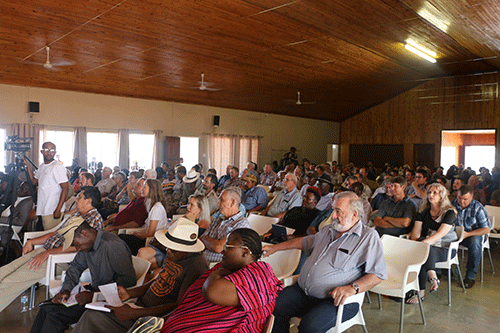LEONARDVILLE – Tempers flared here last Friday with village council members denying allegations of bribery while others warned of imminent danger to scarce underground water resources should contentious uranium mining proceed in the area.
Leading the charge for Omaheke uranium is Headspring Investments, the Namibian subsidiary of Russian company Uranium One, which in turn is part of the Russian state-owned nuclear energy company Rosatom.
“A hungry man is an angry man. It is not settling well with a lot of us here that those opposing are saying Uranium One is buying our silence. This is bringing out emotions, and I stand to defend my people,” said chairperson of the Leonardville Village Council, Petra Witbooi.
According to Witbooi, Uranium One’s operations can potentially open the floodgates for the development of the isolated village. She said, to the applause of many residents, that she has no doubt the company will help tackle unemployment and poverty in the village.
The heated meeting that took place was facilitated by the parliamentary standing committees on Economics and Natural Resources as well as Economics and Public Administration. The committees convened the meeting to address complaints by residents, including geologists and farmers.
The ongoing squabble emanates from the discovery of uranium in territories surrounding Leonardville, which is one of the most underdeveloped settlements in the Omaheke region. Last year, water and land reform minister Calle Schlettwein took a firm stance that no uranium mining would be approved in the area in order to safeguard the quality of scarce groundwater resources located in a massive aquifer in close proximity to the proposed mining area.
After Schlettwein’s directive, exploration activities have been halted. The company proposes using ISL, also called in-situ recovery (ISR) or solution mining, which is an extraction process used to recover minerals such as copper and uranium through boreholes drilled into a deposit.
However, some local farmers and environmentalists are adamant there are more risks than advantages associated with the proposed uranium extraction.
At a well-attended gathering, residents opposing the project accused Uranium One of “buying” the most vulnerable residents with targeted projects in the village. The concerned residents said social investment projects are directed at certain segments of society knowing best the area suffers heavily from socio-economic challenges.
Environment concerns
In strong opposition to the uranium project is geologist Roy Miller, who said many of the environmental problems occur underground. He implored the government not to let the uranium mining continue. During a presentation on behalf of the Stampriet Aquifer Uranium Mining Association (SAUMA), Miller remained adamant that the proposed uranium extraction method poses a genuine and severe threat to underground water supplies.
According to SAUMA, the in situ-leaching extraction process poses a real threat to the Stampriet Aquifer, which they emphasised is the only year-round supply of drinking water in the southeast of the country.
Furthermore, a commercial farmer in the area, Johan Brandt, expressed concern about water contamination, noting the risks far outweigh the benefits. He, therefore, urged the community to stop politicising the problem against commercial farmers.
“This issue should not be a dividing factor, but we should have one interest to protect the underground water. We cannot allow our people to be used as an experiment of this method, as this will just add salt to open wounds,” said the concerned farmer.
Uranium One responds
Uranium One stated it has thus far spent over N$3.8 million on corporate social responsibility (CSR) in the area and has invested some N$850 million on exploration processes.
Director of operations at Uranium One, Aldo Hengari said the company subscribes to the philosophy that the community in which it operates must always be highly valued.
“There is high unemployment in the Leonardville area, and a large number of households cannot afford a simple meal. The high death rate, of 50 children, reported last year has been attributed to severe shortage of food. As an internal company, making investments in Namibia, it is our responsibility to help complement the Namibian government’s effort in improving food security,” said Hengari.
Meanwhile, chairperson of the natural resources committee, Tjekero Tweya said a decision will be taken after due diligence and adequate consultations.
Also, ministry of water spokesperson, Jona Musheko said a report by the ministerial committee is being compiled by all affected ministries. He noted the necessary steps will be taken once the report is complete.



